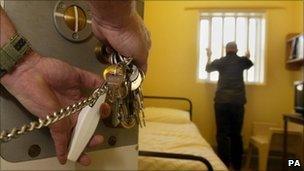Sentencing plans 'would not reflect severity of crimes'
- Published

Ministers want to cut the 85,000 inmate population in England and Wales by 3,000
Planned reforms to sentencing policy could lead to criminals spending too little time behind bars, according to several top judges.
Lord Justice Thomas and Lord Justice Goldring said halving sentences for those who plead guilty early would not reflect the "seriousness of offences".
It could also result in innocent people being jailed, they warned.
The Ministry of Justice said the plans aimed to "break the cycle of crime by reforming criminals".
The proposal to halve sentences for those who plead guilty at the earliest possible opportunity was outlined by Justice Secretary Kenneth Clarke in a Green Paper, external on sentencing in England and Wales.
Launching the paper in the Commons in December last year, Mr Clarke said the present criminal justice system "falls short of what is required" - with around half of those released from prison going on to reoffend within a year.
Ministers want to cut the 85,000 inmate population in England and Wales by 3,000, reducing the £4bn prison and probation budget by 20% over four years.
Mr Clarke has faced criticism within certain sections of the media for pledging to curb the rise in prisoner numbers, but he has insisted he never called for an end to short sentences.
'Original culpability'
Lord Justice Thomas, vice-president of the Queen's Bench Division, and Lord Justice Goldring, the senior presiding judge of England and Wales, said it would not be "right" to go beyond the current rules - which allow for a discount of up to a third for a guilty plea.
The plans could lead to a defendant being sentenced to three years in jail, but having this reduced to 18 months and then only serving nine months - or even less if eligible for a home detention curfew, the judges said.
"Such a relatively minimal period in custody (albeit only a few months short of the present position) would cross the line into becoming an inappropriate reflection of the original culpability," they said.
"A discount of 50% for an (early) indication of guilt... risks, even for a suspect whose lawyer is present, crossing the boundary between giving the guilty the incentive to plead guilty and leading the innocent into making false admissions."
Instead of greater discounts, there should be a "greater distinction between the discount available at the first stage and that available later through the process", they said.
Judge David Swift, chairman of the criminal sub-committee of the Council of Circuit Judges, added that any increase in the discount given for guilty pleas would benefit serious offenders the most.
Sentences are already often criticised by the public for being too lenient and "if the amount of 'credit' available is increased still further the outcome will appear even more disproportionate to the offending", he said.
A Ministry of Justice spokesman said: "There is no question that we must protect the public from the most dangerous criminals in our society.
"However, we must also ensure the courts have the power to make the right response to stop people committing crime."
- Published15 December 2010
- Published7 December 2010
- Published7 December 2010
- Published5 October 2010
- Published11 June 2011